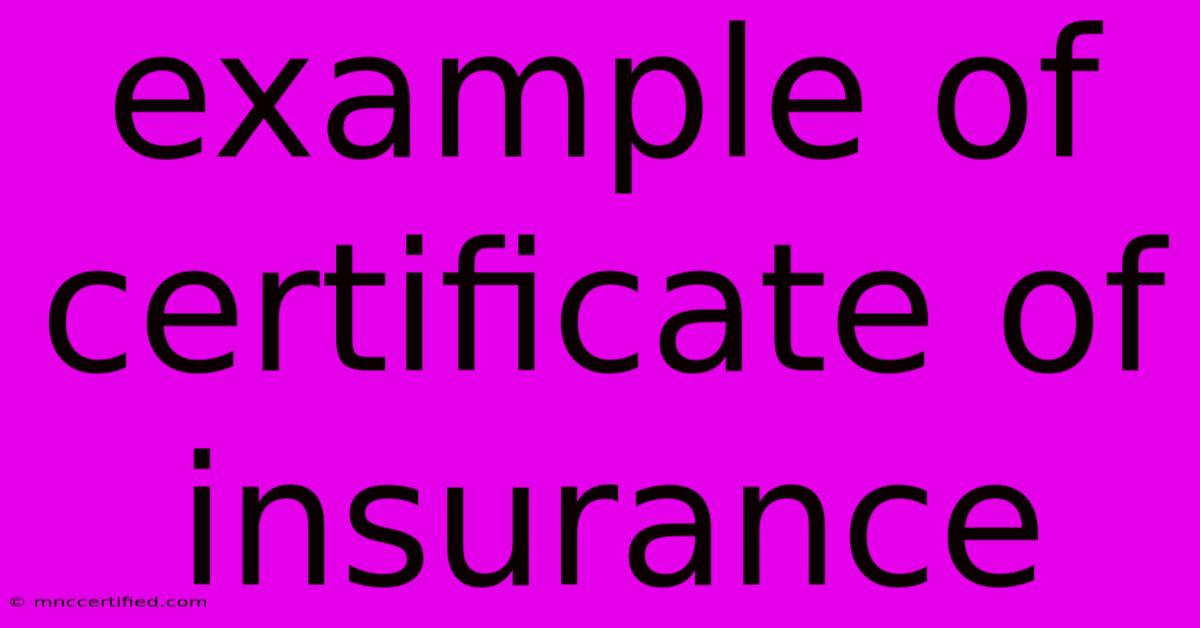Example Of Certificate Of Insurance

Table of Contents
Understanding the Importance of a Certificate of Insurance: A Comprehensive Guide with Examples
A Certificate of Insurance (COI) is a crucial document that verifies the existence and coverage of an insurance policy. It's essential for various reasons, from securing contracts to ensuring compliance with legal requirements. This comprehensive guide will walk you through the key features of a COI, provide real-world examples, and offer valuable insights into its importance.
What is a Certificate of Insurance (COI)?
A Certificate of Insurance (COI) is a concise document issued by an insurance company. It summarizes the key details of an insurance policy, including:
- Policyholder: The individual or organization who owns the policy.
- Policy Number: A unique identifier for the insurance policy.
- Type of Coverage: The specific type of insurance coverage (e.g., liability, property, workers' compensation).
- Effective Dates: The period during which the policy is in effect.
- Limits of Liability: The maximum amount the insurer will pay for covered losses.
- Insured Parties: Individuals or organizations covered by the policy.
- Insurer Information: The name, address, and contact information of the insurance company.
Why are COIs Important?
COIs play a vital role in numerous business and personal scenarios:
- Contractual Agreements: Many contracts, especially those involving construction, rentals, or events, require a COI as proof of liability coverage.
- Legal Compliance: Some industries and states mandate COIs for licensing, permits, or regulatory requirements.
- Project Approval: Many organizations require COIs from vendors or contractors to ensure financial protection during projects.
- Insurance Verification: COIs help verify the existence and coverage of an insurance policy, providing peace of mind to parties involved.
- Risk Management: By confirming the scope of coverage, COIs assist in risk assessment and mitigation.
Real-World Examples of COIs
Here are a few examples of how COIs are used in different contexts:
- Contractor Working on a Construction Project: A general contractor may require a COI from subcontractors to demonstrate liability coverage for potential accidents or damages.
- Event Organizer Renting a Venue: A venue may request a COI from an event organizer to ensure coverage for any incidents that may occur during the event.
- Business Leasing a Space: A landlord may ask for a COI from a business tenant to protect themselves from potential liability issues.
- Individual Seeking a Home Loan: A mortgage lender may require a COI to verify homeowner's insurance coverage.
Key Considerations when Requesting a COI
- Accuracy and Clarity: The COI should accurately reflect the details of the insurance policy and be clearly written.
- Specific Coverage: The COI should specifically detail the type of coverage needed (e.g., general liability, workers' compensation, property insurance).
- Named Insured: The COI should clearly identify the named insured party.
- Expiration Date: Ensure the COI is valid for the duration of the project or contract.
Obtaining a COI
You can typically obtain a COI by contacting your insurance agent or broker. Many insurance companies also offer online portals for policyholders to request and download COIs electronically.
Conclusion
Certificates of Insurance are indispensable documents that provide crucial proof of coverage. Understanding the purpose and contents of a COI is essential for individuals and businesses across various industries. By proactively requesting and reviewing COIs, you can ensure compliance with contractual obligations, mitigate risks, and secure financial protection.

Thank you for visiting our website wich cover about Example Of Certificate Of Insurance. We hope the information provided has been useful to you. Feel free to contact us if you have any questions or need further assistance. See you next time and dont miss to bookmark.
Featured Posts
-
2025 Pitbull And Lil Jon Tour Uk And Europe
Nov 13, 2024
-
Georgia Boat Insurance Requirements
Nov 13, 2024
-
Executive Bonus Plan Life Insurance
Nov 13, 2024
-
Kim Leadbeater Assisted Dying Bill With Strict Rules
Nov 13, 2024
-
Mcr Announces Stadium Tour Chicago Included
Nov 13, 2024